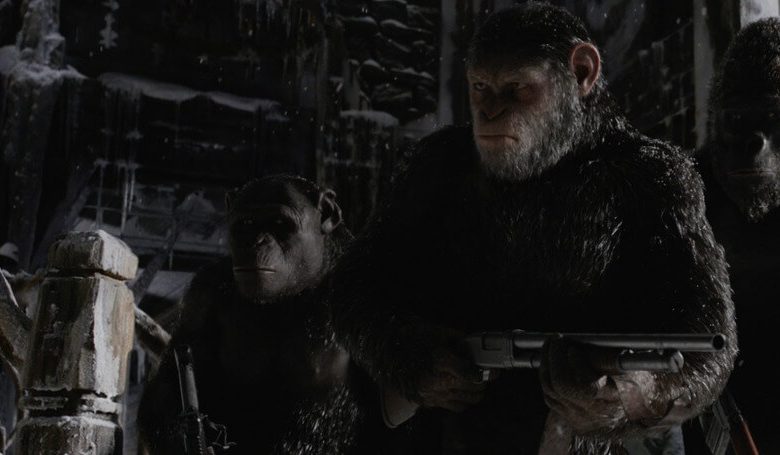Here’s What ‘Apes’ and Zombies Have in Common

It’s hardly a spoiler to reveal the apes have the upper hand in the rebooted “Planet of the Apes” franchise.
The franchise’s title gives the game away. So do memories of that partially buried Statue of Liberty.
What’s more interesting about the franchise is what the films say about us … and the critics who trip over themselves praising it.
The three films are so different at times they appear to be from unique franchises. The original has a softer side, as James Franco’s scientist bonds with the mutated ape Caesar before realizing the fallout from his genetic tinkering.
The second is dark, unblinking and cold, revealing just how much trouble humanity is truly in. “War” offers a more micro look at the “Planet” under consideration. The bulk of the film involves a human base camp with a leader (Woody Harrelson) with delusions of Col. Kurtz circa 1979.
“We are not savages. Apes kill only to survive,” one ape declares in the film’s official trailer. The humans? Now, that’s a different situation.
In fact, that’s the through-line for the whole saga. Humanity’s inhumanity to their fellow living creatures. It’s proving to be catnip for critics who adore the saga’s dark view of the human race. It’s edgy!
Sure, those apes probably could use a Calgon bath, but they don’t turn on each other.
Slate’s Dana Stevens couldn’t be giddier about that storytelling motif. Could the current White House occupant factor into her commentary? Or is this Climate Change alarmism in review form?
As the decline and fall of the human empire continues apace outside the movie theater—where it’s been a hot summer in a world rapidly getting much hotter—War for the Planet of the Apes, the third installment in the best blockbuster franchise currently running, takes the self-destructive path our species seems to have chosen straight to its logical endpoint.
RogerEbert.com’s Brian Tallerico also piled on, proclaiming Humanity Version 2017 to be a failing model.
“War for the Planet of the Apes” is a mirror to what human beings are like in 2017 as much as anything else. It is about infighting and vengeance. It is about loss and the need for people to hold on tightly to that which keeps them going. When our support systems are wrenched away, we respond with anger and violence.
One wonders if the reviews would reflect such a cynical view had “Apes” hit theaters during the Obama years.
The “wicked humanity” angle is hardly new. We’ve seen variations on it before, which makes the newest “Apes” movies feel a mite stale.
Disagree? You haven’t been watching “The Walking Dead” for the past eight years. The AMC smash follows a very similar template, even though we haven’t seen a single chimp strolling across the post-apocalyptic terrain.
The Walkers feast on human flesh, but they’re unthinking automatons following their essential purpose. It’s the other humans Rick and co. have to worry about. What’s scarier, the sight of a Lucille-wielding Negan or a gaggle of Walkers heading your way?
No contest.
Season after season it’s the show’s human villains that cause the most havoc, from The Governor to Negan. They’re smarter than the average Walker. They can sour hearts and minds and kill on a grand scale when the opportunity strikes.
Heck, the undead are pikers by comparison.
The show’s bleak take on humanity has its roots in the godfather of the zombie craze, George A. Romero. The shock auteur’s groundbreaking “Night of the Living Dead” depicted the human survivors of the undead outbreak in similarly dark ways.
The film ends with some gun-toting humans taking out the film’s surviving hero, played by Duane Jones.
Subsequent “Dead” installments played up Romero’s unflinching critique of his fellow man. The 1978 classic “Dawn of the Dead” mocked our rapacious appetite within the mall setting. Later “Dead” films featured humans shooting zombies hung up by their decaying necks for sport.
Seen from that cultural perspective, both “TWD” and the “Apes” franchise are part of a long, and particualarly dour, tradition.

The first movie in the new series had set up basically identical to that in Richard Matheson’s “I Am Legend,” which was George Romero’s biggest influence on his zombie films.
The “wicked humanity” angle is hardly new.
—- Indeed; that’s a narrative that goes right back to the Book of Genesis. Which is why I’ll never understand why the left sends so much vitriol at the Christians. Every leftist cause from Marxism, to Feminist Theory, to environmentalism is barely concealed reboots of Christian doctrines.
While people often bemoan the lack of originality in movies….clearly in politics we ran out ideas even earlier.